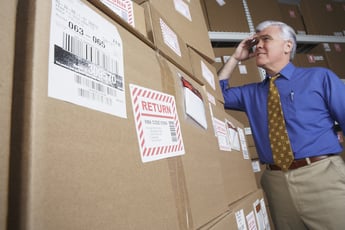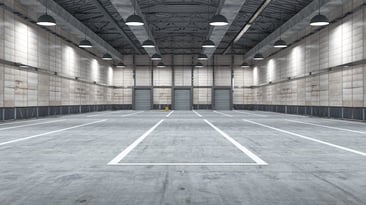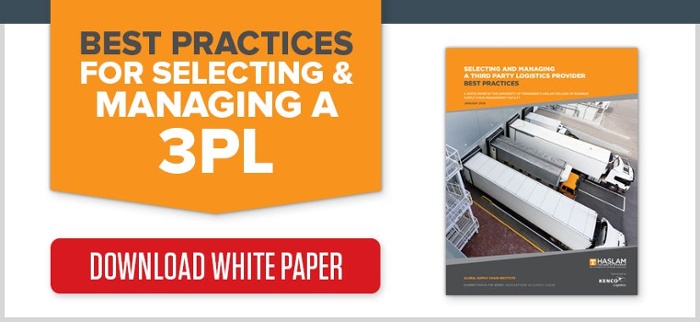
As companies change and grow, the infrastructure that supports them needs to follow suit. That means adding additional employees, new office space, more stock, and narrowing your focus to what you do best. For many businesses, that means outsourcing time-consuming logistics processes and services.
So how do you know if your company is ready to start using a third-party logistics provider? Here are six guiding "flags" you should carefully consider while planning your next moves:
Indicators That You Need a 3PL
There is no magic number or threshold that will signal the precise moment you'll need a 3PL rather than in-house approaches, but there are some telling signs. If any of these sound familiar, you should consider finding a 3PL provider:
1. Your costs are increasing steadily.
Sometimes, through smart management and fortunate timing, a company grows much faster than it anticipates. Unfortunately, this can bring some "growing pains" to the forefront as your logistics network struggles to keep pace. As costs in labor, material handling equipment, facilities, and even staff start to creep upwards, the financial moves you make might not always get the consideration they should.
A 3PL helps standardize and grow your logistics solutions in a logical, scalable way without demanding your ongoing attention, time, or effort to operate.
2. Your team is overwhelmed—and you aren't sure you can fix it.
In the rush to keep up with increased orders or an expanded SKU catalog, are you worried you won't have the time for searching, interviewing, and onboarding additional logistics staff? In a busy period, managerial staff should be devoting their focus to keeping operations running smoothly, not staffing the warehouse. A 3PL knows the ins and outs of logistics hiring in addition to having a deep talent bench themselves, and will ensure you always have appropriate staff levels to meet demand.
3. Your customer service complaints are piling up.
 As order volume increases, more things typically fall through the cracks. That doesn't have to be a given, however. Most 3PLs have customers who have either grown quickly or go through large seasonal volume swings. This requires them to have a plan for adding labor, equipment, and capacity when needed to support their customers’ growth or volume surges.
As order volume increases, more things typically fall through the cracks. That doesn't have to be a given, however. Most 3PLs have customers who have either grown quickly or go through large seasonal volume swings. This requires them to have a plan for adding labor, equipment, and capacity when needed to support their customers’ growth or volume surges.
Leveraging a 3PL’s expertise in these areas can allow you to grow your business without growing the number of dissatisfied customers you are dealing with. 3PL systems, in addition to improving operational efficiency, can also improve visibility to order status, both for your customer service representatives and your customers. This can eliminate the frustrations customers sometimes experience when they can’t get their questions answered in a timely manner.
4. Your inventory isn't correct or is burdened by obsolete items.
Inventory carrying costs can be a significant burden on a company’s financial statements. Low inventory accuracy, poor visibility, and operational inefficiencies can cause companies to increase their safety stock as a buffer against these issues. Carrying excess safety stock or obsolete inventory is not only a financial burden, but can lead to your warehouses being overcapacity, which can increase product damage and safety issues while hindering productivity.
A 3PL can provide the visibility, analytics, and operational efficiencies needed to optimize the amount of inventory in your warehouses.
That means more shelf space for your faster selling items or for new products, which can mean less out of stock issues. A 3PL can also help you expand your distribution network to bring in more of what your company needs, be it raw materials, components, or finished products.
5. You're moving to a new facility or sales region, and don't know where to start.
 From budget-friendly material handling equipment acquisition, to locating a facility, to intelligent stocking layouts, a 3PL can ease the transition from old to new. They'll help by setting up your warehouse, getting your products moved in, and putting you in touch with local resources so you can eliminate operational downtime.
From budget-friendly material handling equipment acquisition, to locating a facility, to intelligent stocking layouts, a 3PL can ease the transition from old to new. They'll help by setting up your warehouse, getting your products moved in, and putting you in touch with local resources so you can eliminate operational downtime.
Additionally, international expansion is made significantly easier with a well-trained international logistics ally in your corner, so be sure to get in touch before your first shipments start crossing continents.
6. You need to reduce risk and all of its associated costs.
Running a warehouse means shouldering a great deal of expenses—and a lot of them have nothing to do with stock levels. Issues like EEOC claims, workers compensation, environmental risks from mishandled products, product damage—these are all liabilities that come with substantial financial risks that can be avoided by outsourcing your warehouse work and management.
What to Do Once You've Made the Call
If you've considered these "trigger areas" and decided to start working with a 3PL, how do you find the right one for your company? While dynamic 3PL companies can successfully serve a wide variety of industry clients, there's no such thing as a "one size fits all" approach in logistics.
You'll need to complete a thorough needs assessment so you can find the logistics partner that best meets your needs. Use these 4 steps to define where you are and what your expectations are as a company:
Step 1: Figure out your pain points.
Where are you falling short? Chances are there were at least one or two major issues listed above that caused you to start considering a 3PL in the first place, so be honest about your issues when interviewing potential logistics partners.
Step 2: Determine an accurate picture of your current state desired future state.
It’s important to understand the opportunities for improvement in your supply chain so you can communicate your needs and expectations to prospective 3PLs. This also gives you a baseline to measure the 3PLs performance. Transparency in any relationship is important.
Being honest about your goals in an outsourcing relationship and then jointly working with your 3PL to develop and execute a plan of action is the surest path to success.
Step 3: Discuss your business culture as well as that of your 3PL, correcting for any inconsistencies.
The journey is just as important as the destination when it comes to sustainability and scalability, and that means using safeguards to prevent an employee or managerial culture clash along the way.
Step 4: Verify both their experience and legitimacy.
Ask your 3PL prospects if they are considering acquiring other companies or being acquired themselves. There has been significant M&A activity in the 3PL space in recent years. If your chosen 3PL partner is acquired, you may end up dealing with a completely different set of business partners and a company with a different culture than you initially signed up for. Also ask them if they have experience in your industry vertical or currently have similar operations that they manage.
Don't spend your valuable budget dollars to be a guinea pig for their concepts—walk into the partnership with your eyes wide open and trust in their history, but only if it's earned. You'll also want to check their legal background and ensure they haven't needed to navigate a bankruptcy in the past.
To Sum It Up
Partnering with a 3PL is the positive "turning point" for many companies: a trustworthy support network to launch them into real growth. That doesn't mean that choosing one is easy, of course! If you're ready to go but feeling a little lost, read our Selecting and Managing a 3rd Party Logistics Provider whitepaper for some excellent, actionable insights.



